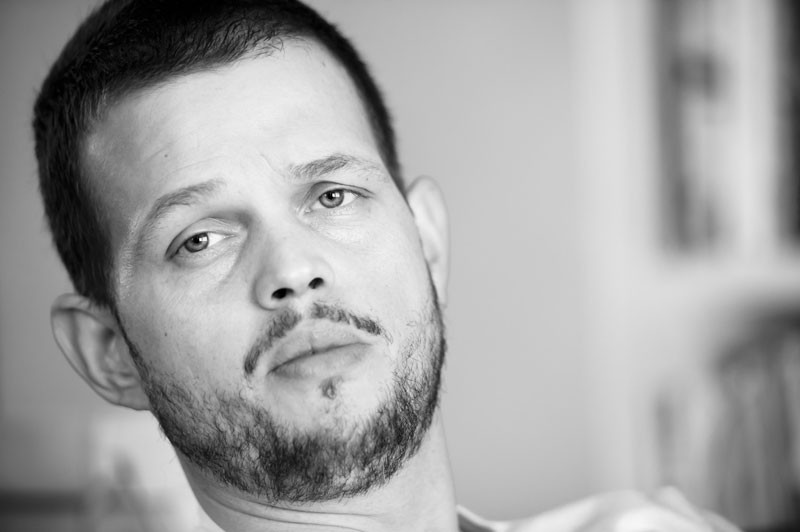War resister continues fight to stay in Canada
No more appeal options for former soldier
An organization made up of friends and family of U.S. war resisters seeking refugee status in Canada presented a letter to Provencher MP and federal minister Vic Toews on Jan. 19, requesting a meeting to discuss his opinion of deporting U.S. war resisters from Canada back to the United States.
“Your government has deported two war resisters to date and each ended up serving lengthy jail sentences in military prisons, experiencing cruel treatment,” the letter read in part.
“Several other resisters are in danger of deportation, so we would like to meet with you on an emergency basis. These are young people, many with young children and in dire need of health care from their own suffering in war.”
The letter was signed by Cheryl-Anne Carr for the Keep Resisters in Canada Campaign.
The subject hits close to home for Carr, whose son-in-law, Joshua Key, is a war resister.
Key, a deserter of the United States Army, is living in Canada hoping to find refuge and avoid criminal prosecution or witnessing more warfare atrocities back in Iraq.
Now living in Saskatchewan with his wife, Key first joined the military in 2002 at the age of 22. He has been in Canada seeking refugee status for six years.
“It was death, destruction and chaos – that was my time in Iraq,” said Key, who was a Private First Class in the U.S. Army and spent six-and-a-half months in Iraq performing over 200 raids on private residences.
In Iraq, Key was part of the Quick Reaction Force (QRF), which is similar to a SWAT team for the military.
While in the QRF, Key says he witnessed a soldier kicking the decapitated heads of two Iraqis around like soccer balls, a little girl’s head explode by gunfire and a teenage girl being carried away to be raped.
Back in the continental U.S. on a two-week leave, Key started having symptoms of post-traumatic stress disorder. He called a military lawyer and asked what options he had.
Key told the lawyer he would do anything to stay in the military, but he would not return to Iraq.
Faced with either going back to Iraq or going to prison, Key decided to go into hiding. He took his family and hid in Philadelphia for 14 months before moving to Canada.
After an interview with CNN, the U.S. military contacted him and informed him of three possible outcomes if he returned to America: they would send him back to Iraq because he still had valuable skills they could use, put him in prison for up to 20 years, or they could execute him by firing squad.
According to Key, the Uniform Code of Military Justice states that desertion at the time of war is death by firing squad.
He recently found out that he was denied reconsideration of his Immigration and Refugee Board (IRB) appeal and now has no governmental agency to turn to for help.
Chris McCluskey, the communications special assistant to the Minister of Public Safety Vic Toews, stated that the current Canadian immigration policy is flexible for special circumstances.
“ It was death, destruction and chaos – that was my time in Iraq.
Joshua Key, war resister
But on the other hand, he said that the IRB “has rejected every war deserter refugee claim from the U.S. it has heard.”
“These people have been found not to be legitimate refugee claimants,” said McCluskey. “We find it hard to believe that Barack Obama is persecuting U.S. citizens.”
The IRB is an independent administrative tribunal, much like a judicial court. It makes decisions on cases that are handed to them by either the Canadian Border Services Agency or the office of Citizenship and Immigration Canada.
According to Melissa Anderson, a spokesperson for the IRB, deserters like Key have few options if they are denied refugee status.
“Every person who makes a refugee claim ... essentially has a conditional departure order to depart from Canada should this all not work out,” she said.
This would mean that since Key has no more appeal options, he would either have to find another way to stay in Canada or face deportation.
In defence of deserters like Key, activist groups cite the international disapproval the war garnered from the start.
“They are trying to avoid a war that we have universally condemned as an illegal and unjust war,” said Michael Welch, the Winnipeg chapter chair of the Council of Canadians, an advocacy group promoting social and economic justice.
When the war started back in 2003, Kofi Annan, the Secretary-General of the United Nations, said the invasion did not conform with the UN charter.
“The Conservative government has been quite hostile in their conduct toward the war resisters,” stated Welsh. “All the other parties have been supportive of the right to just stay in Canada.”
Published in Volume 65, Number 18 of The Uniter (February 3, 2011)







